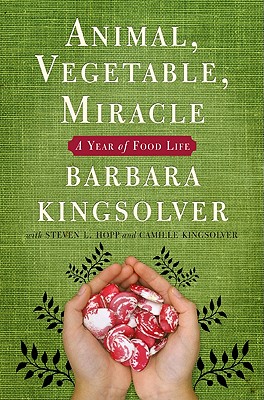Well, it happened again. I finished a book and am awash in mixed feelings. It reminds me of the last day of a school year when you loved your teacher so much, so deeply, that you can barely stand to say goodbye, yet the teaching is done and summer awaits. Tonight I am equal parts numb from the vigorous grooming and tingling with motivation to put this new knowledge into action.

Studying Barbara Kingsolver’s memoir of her family’s twelve-month foray into strict locavorism has been a spiritual experience for me. No kidding. She offers us in her book Animal, Vegetable, Miracle a literary gumbo of earth science, animal husbandry, human cultural history, religion & morality (yep, I think those are different), politics, economics, and philosophy. With a hefty dash of humor. I read it on multiple high recommendations from trusted people, and now I suppose I’m offering my own:
Buy this book. It is an inexpensive purchase (I spent less that seven bucks on my hardback copy, albeit second hand). Don’t check it out, because I predict you’ll be marking and dog-earing and highlighting yours a lot. I sure did. One way or another, if you love food, read this wonderful book.
If you have the gardening sickness or a penchant for raising your own edible animals, study these pages. I found them to be endlessly inspirational this week between monotonous chores. When I thought that the wheel-barrowing of dried manure would never end and the glorious day to plant my broccoli starts would never come, much less the clipping of fragrant basil, I just sat down with a glass of water and soaked up half a chapter of the book. And my bones found the energy they needed for a few more circuits of shoveling and bed filling. Her words helped me to visualize my summer garden.
Even if the mission of eating locally is not that appealing to you, it’s an incredible family story and raises a plethora of tantalizing debate topics for your smarmy dinner parties.
And yes, I know what a plethora is.
There are so many things I could tell you about this book. Let me just try to tempt you a little rather than rewrite her masterpiece:
Some of the Juicy Topics That Beg Further Discussion:
- Environmental overdraft
- Demand side management
- Illusion of top soil
- Realignment with the food chain
- Food Culture, or lack thereof
- Knowing the provenance of your food
- Self sufficiency as an act of patriotism, pointing back to Thomas Jefferson
- Amish values and the beauty of boundaries
- Agricultural agnostic
- Xantolo
- Culture being the property of a species, not just of the wealthy
- Growing pizza
- Life as a zero-sum equation (time management comment)
- The draw to garden again and again and again, despite hardship
- Economics of growing it yourself and the intrinsic rewards that overshadow this
- The differences between harvesting and killing
- The religion of time saving
- Food Security
…And so much more. I need to find a few other people who have read this book in order to bounce some things around. Julia assures me that contacting the author would not be stalker-ish, but I have my doubts.
How about a few quotes that glowed most brightly to my eyes?
“A lifetime is what I’m after.” Me too. Enough with the instant gratification business. We’re missing so much by rushing.
“From the ground up, everything about nourishment steadies my soul.” She spoke at length here about everything from soil preparation to harvesting and cooking from scratch for your family and friends.
“I decided my poultry patient could use a mental health day.” Amen, sister! This was from a particularly excellent chapter about heirloom turkey reproduction.
“Perfect is not the currency of farming.” Perfect is much less beautiful anyway.
“Cooking is 80% confidence, a skill best acquired starting from when the apron strings wrap around you twice.” This made me cry. My girls started cooking when they could barely stand steady on a chair at the kitchen counter, and a half aprons looked like ball gowns on their beautiful, skinny little bodies.
“One of the best things gardens can teach students is respect: for themselves, for others, and the environment.” How exciting, by the way, that school systems around the country are adopting curricula that get their students dirty and happy!
“Some things you learn by having to work around the word no.” Brilliant.
“For one thing, hogs are intelligent enough to become unharvestable.” Perhaps you have noticed a conspicuous absence of hogs at the Lazy W.
and finally…
“Nothing is more therapeutic than to walk up there
and disappear into the yellow-green smell of the tomato rows
for an hour to address the concerns of quieter,
more manageable colleagues. Holding the soft, viny limbs
as tender as babies’ wrists, I train them to their trellises,
tidy the mulch at their feet, inhale the oxygen of their thanks.”
Are you sighing along with me? And I promise you that Kingsolver retains her sense of wonder and poetry in every single chapter. I have never read so many cold, hard facts written this lyrically.
Speaking of chapters, there are twenty. The story begins with some background about the family’s motivation for this journey and ends just after their year of locavorism concludes. Every chapter is an adventure, and the author shares the papery stage with her husband and teenage daughter.
I have to admit a smidge of relief to understand that they viewed the year long experience as a singular one, but still one that would precipitate change in their lives. I personally am just not energetic or reliable enough to be a fanatical about anything, so it grooves me to approach the ideas herein gently, with slowness and a bit of caution. In other words, the Lazy W will be supplementing our groceries more heavily this year than ever before, but I do not predict we will place a buying freeze on all things non local or inorganic.
Have you read this book? Do you want to chat it up with me? Do you want to borrow my copy? Do you need some manure for your compost heap? We have plenty, so bring your shovels.
We Have a Paradise at our Disposal.
xoxoxo





